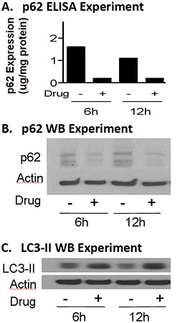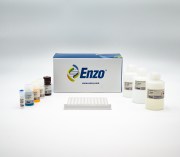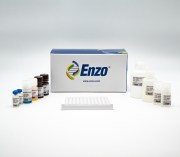High Quality ELISAs for Mesuring Autophagy

Sensitive Kits for Detecting and Quantification
Sensitive p62 ELISA Kit allows for quantitative, immunometric detection of the autophagy biomarkers in human, rat and mouse cell lysates. The p62 protein has a dual functionality as both a scaffold protein and aiding in trafficking for protein degradation. ELISA kits enable quantitative measurement of autophagy without the need for expensive equipment or long procedures.
- Sensitive assays measure as little as 100 pg/mL of p62
- Fully quantitative results surpass semi-quantitative Western blot analysis
- High throughput format allows analysis of up to 40 samples in duplicate in less than 3 hours
- Easy-to-follow protocols and liquid color-coded reagents save time and reduce errors
Three Different Methods of p62 Detection and Quantification

Human breast cancer cells were treated with either autophagy-inducing drug or vehicle. Cells were harvested 6 and 12 hours post-treatment, lysed, and analyzed with the p62 ELISA kit, and for p62 and LC3- II by Western blot. Drug treatment correlated with the induction of autophagy as indicated by the decrease in p62 levels (A and B) and by elevation of LC3-II levels (C).
 Lab Essentials
Lab Essentials AMPIVIEW® RNA probes
AMPIVIEW® RNA probes Enabling Your Projects
Enabling Your Projects  GMP Services
GMP Services Bulk Solutions
Bulk Solutions Research Travel Grant
Research Travel Grant Have You Published Using an Enzo Product?
Have You Published Using an Enzo Product?

